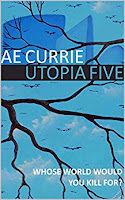The Panopticon Series Goes Open - Utopia Five Will Become Free To Read
Radically Open
"persuasive possible future history of how climate change, surveillance and society could play out for us over the next 40 years, and a great detective page-turner as well." - Amazon review Utopia Five
After six years, I have finally decided to open my Panopticon scifi series under a creative commons license friendly to the 'bots. (BY-NC)Give my novels away for free? Have I lost my mind?
Show Me The Money
The Panopticon series is a set of scifi/clifi/solarpunk mysteries and thrillers based in an alternative history near-future where the world becomes radically open - a panopticon.
"an unexpectedly deep and conceptual sci-fi techno thriller" - Amazon review Utopia Five
It has sold thousands of copies on Amazon and I had always one day hoped to make it available for free under a CC license but that was a big risk. Surprisingly though, not a financial one.
I've written plenty of popular fiction and non-fiction, including with well-known tech publishers like O'Reilly, and I can assure you you don't write books to make money. For most of us authors, there is no financial risk to open sourcing a book because making almost nothing is already a near certainty. If you want to become a millionaire, it's a better bet to buy a lottery ticket than to do the painful work of writing a novel - even a successful one. The only rational reason to write a book is because there's an idea you desperately want everyone, including yourself, to think more about.
You could bore folk about your thoughts down the pub, but if you want to reach people you don't already know, at scale, the traditional method is via a book that you manage to persuade them to read.
For all Amazon's faults, it does provide a channel for that. My primary marketing tool has always been their promos, which are only available for closed source books. As soon as the Panopticon series gets released publicly, I'll lose that channel. That was not an easy choice to make because the thoughts in my Panopticon novels are ones I really do want folk to consider and debate. That means I need to reach them.
“The only series I've read that touches on every topic I care about: Artificial Intelligence, surveillance, climate change, individual vs state, space, programming, infosec” - Marco Abis
However in 2025 I felt the necessity of embracing openness now. What changed my mind? ChatGPT.
Origin Story
Have I become a delusional AI Whisperer?
When I say that ChatGPT convinced me to release the Panopticon series under a CC license, I mean that figuratively rather than literally. What ChatGPT convinced me of was there was a new way of reading books that made an open source version of Utopia Five (with the remainder of the Panopticon series released over the following year) more urgent and more important.
"The real genius in Currie's books is that the core ideas are quite simple - intelligent characters in games, clever technology in clothing - but by combining them in clever ways they lead to surprising and quite frightening scenarios. Added to this, the pace is exhilarating and the style is illuminating." - Amazon review Denizen 43
In 2025, I first realised that when chatbots have access to a book's text it changes the experience of reading that book. It gives you another reader to chat with about the book - a reader with eidetic recall of not just the book itself but every other book it is related to. For me, it was a completely new take on reading, and one only possible if the book was out there to be accessed by the chatbot. I suspect chatbots will be a major part of the future of literacy. That alone should have been enough reason for me to put my own books in the public domain and learn from that. It wasn't. I realised there was an even more important reason to do it.
"A fast-paced and entertaining tale, I’d recommend it for the story alone. But what I enjoyed even more was the weaving in of current-day themes: climate change and Big Brother surveillance. The latter is central to the narrative, and handled in thought-provoking fashion." - Amazon review Utopia Five
The Panopticon series is about nuanced new technologies just like ChatGPT. Their pros and cons, their benefits and risks, the thinking that we all need to do about them. New technology can be used for good or ill and in my novels, it's always both. I wrote them because I wanted people to think that way - equivocally. It's seldom obvious what's bad and what's good, it usually depends on the situation. Sitting on the fence has a bad name and is seldom comfortable, but it does give you a better view.
I once told a younger developer that our job was to avoid building a dystopian future and she asked who I was to judge that? Eight novels later, I'm less sure than ever. Making the Panopticon open is my chance to get other folk involved in answering her excellent question.

.jpg)

Comments
Post a Comment